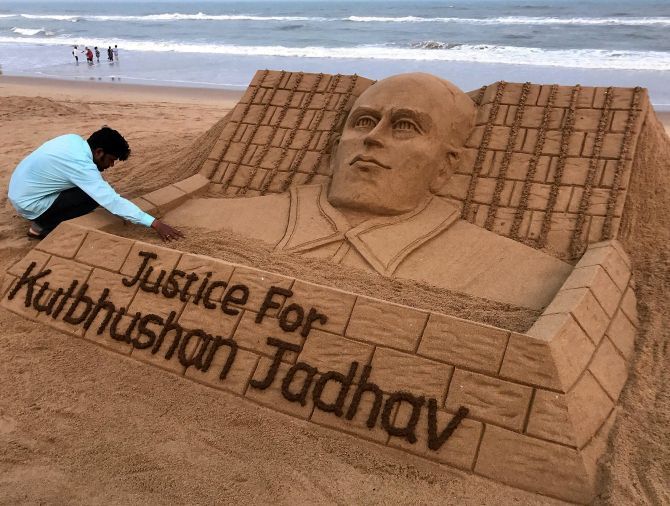'There are thousand ways to pressure Pakistan to make it behave.'
'Going to the ICJ was the worst possible option,' says Colonel Anil A Athale.

Any student of history knows the disaster India courted when then prime minister Jawaharlal Nehru took the Kashmir issue to the United Nations.
Seventy years after that event, we continue to suffer the consequences of that folly.
Kashmir is the only secessionist movement that is on the UN agenda.
The issues of Tibet, separatism on Mindanao island in the Philippines, the Basque liberation movement in Spain, the Ughur separatism in Sinkiang or the separatism in Northern Ireland -- none of these were ever on the UN agenda.
Kashmir is the only exception and for that the blame squarely lies on Nehru who took the issue of Pakistani aggression against Jammu and Kashmir to the UN where it remains stuck to date.
The Indian freedom movement had a preponderance of lawyers and they had this penchant for looking at political issues from a legal angle. Philosopher K C Bhattacharya remarked that Indians have only a dim awareness of the dark thing called power.
The decision to take the complaint about the Pakistani attack on Jammu and Kashmir to the UN betrayed political naiveté.
The operational part of the UN, the Security Council, is nothing but a club of World War II victors. To think of the UN as some sort of 'world government' was the height of folly that we committed in 1948.
Soon, the dominant Western powers converted our complaint of Pakistani aggression into questioning Kashmir's accession with India. It then became a football in the ongoing Cold War.
Nehru's personal pledge, without Cabinet approval, for a plebiscite in Kashmir compounded the blunder and we have been suffering the consequence for 70 years.
On May 18, 2017, when the International Court of Justice, acting on India's complaint, stayed Kulbhushan Jadhav's execution, it was at best a temporary reprieve.
Pakistan has already made its intentions clear to defy the court.
Citing national security, Pakistan may well still hang Commander Jadhav.
One should not forget that the Pakistan army had no qualms hanging its own prime minister Zulfiqar Ali Bhutto on trumped up charges in April 1979. World pressure had no effect on that country.
One is not for a moment suggesting that India should not make any efforts to save Commander Jadhav. We must!
Speculation is rife that he was kidnapped from Iran. The best way to save him would be to similarly catch Pakistani citizens and then bargain.
It is believed that a retired Pakistani colonel has already been bagged in similar fashion.
There are thousand ways to pressure Pakistan to make it behave. Going to the ICJ was the worst possible option.
Did the overworked and understaffed foreign ministry goof> Or it was a political decision at the highest level?
Whatever the truth, it will be certainly seen as a blunder in time to come.
What stops Pakistan to now take the cases of say the use of pellet guns in Kashmir to the ICJ?
Or for that matter the case of that man tied to an army jeep as a shield against the stonepelters?
Never mind that Pakistan, by its own admission, is using fighter aircraft, artillery and tanks against its own people in Waziristan.
We seem to have indeed opened a Pandora's box!
Serious as this issue is, it seems to be a pattern in recent times.
It is indeed galling when the Turkish dictator on a visit to India this month lectured us on self-determination in Kashmir. Nobody in India questioned him on his own country's decade-long crackdown on the Kurdish minority.
It is surprising why he, a known Islamist hardliner, was invited in the first place.
This week in far off Canada, the Canadian PM openly flirted with Khalistani separatists in his country. All that we managed was a mild disapproval.
Canada's record in letting off the terrorists who bombed the Kanishka on June 23, 1985 and killed 329 Indians is well known.
One only hopes that these were momentary lapses and we do not intend to go back to old Nehruvian Third Worldism where India acquired a reputation as an international 'cry baby.'
It is time Mr Modi took energetic measures to revamp our anemic foreign service by lateral entry. It is a matter of concern that the size of our diplomatic corps is smaller than even an island State like Singapore!
It is time we begin to behave like a big power that we are and not like Nicaragua or Haiti to go running to the UN to solve our political problems!
Guns are the ultimate argument of kings, not lawyer's speeches!
Colonel Anil A Athale is a military historian.
\
IMAGE: Sand artist Sudarsan Patnaik creates a sand sculpture for Kulbhushan Jadhav at the Puri beach in Odisha. Photograph: PTI Photo









